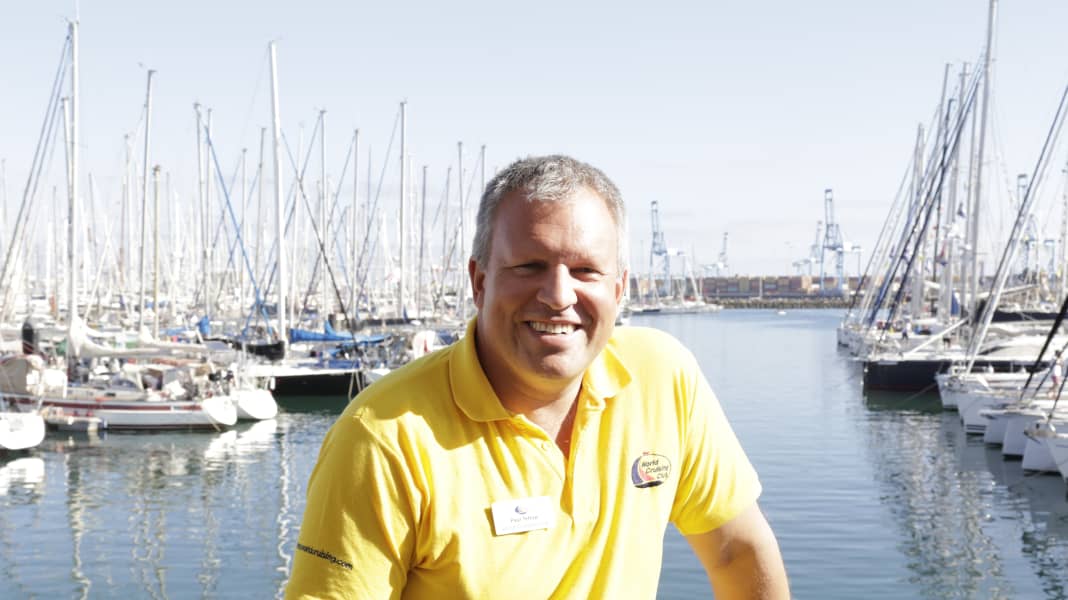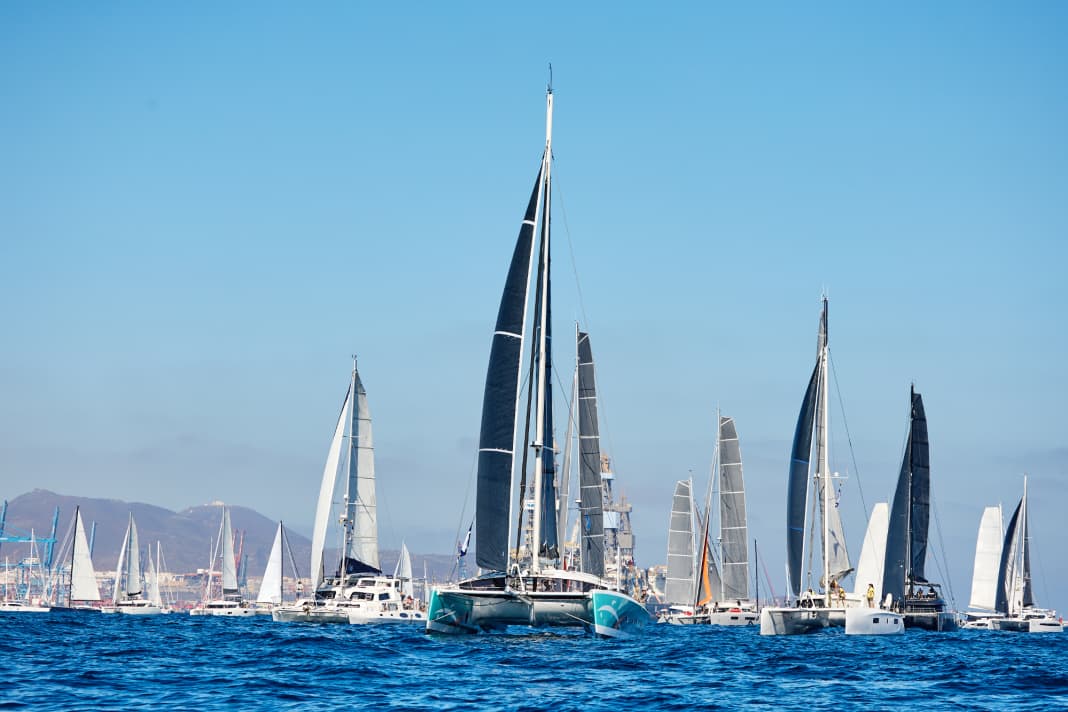
Last year, Paul Tetlow took over the helm at World Cruising. This is therefore his second ARC that he has been responsible for. He is not new to the event, having previously worked as a "yellow shirt". This is the name given to the army of WCC employees who are required in particular for the largest event, the ARC. And whose distinguishing feature is the yellow polo shirt.
World Cruising Club must be made fit for the future
Together with his wife Suzana, who is now Operating Manager, he has already been involved in the ARC and also the World ARC in previous years and has looked after crews before, during and after their trips to the Caribbean or around the world. Paul and Suzana face a number of challenges over the next few years. The cruising and blue water sailing scene is changing and evolving. The WCC must also respond to this. But how?
Shortly before the start of the ARC 2023, in which around 900 sailors from 39 nations are taking part, we met Paul Tetlow for an interview in the marina in Las Palmas.
YACHT: Paul, how do you get so many different crews under one roof?
Paul Tetlow: The ARC thrives on the diversity of its participants. That's part of what makes it special. Our job is to turn them into one big community, to create a sense of togetherness. Despite all the different personal backgrounds, the different levels of sailing experience, the different motivations for taking part here. We achieve this by promising an experience that everyone can and wants to identify with: crossing the Atlantic. Whether for the first time or the second time. And not alone, but in a group and as part of an event that promises a positive experience.
However, it is noticeable that there are numerous subgroups within this large community that you propagated, which do not have much in common, at least at first glance. How do you deal with this?
That is a correct observation. For example, we have the group of berth charter crews. Or the family crews. There are two-handed crews, mostly couples. There are older crews and the young and wild ones. We have the group of skippers and sailors on large, fast yachts or on smaller, sometimes older boats. The group of catamarans. If you wanted to, you could even identify individual ARC participant groups by nationality. We only encourage this group formation to a limited extent. For example, by putting family crews with children on a jetty. Otherwise, we prefer to offer the opportunity for socialising and networking with our seminar, excursion and party programme here in Las Palmas and also at the finish in Grenada for the ARC plus and in St. Lucia for the ARC.
We create a sense of unity"
Will it work?
Yes, but of course not in every case. We just offer it, create the framework. Nobody is obliged to take part in anything or come into contact with other ARC participants. But that's exactly what most people want. That's what many people like the ARC for. Otherwise we wouldn't have so many repeat participants. Anyone who has attended our seminars once does not necessarily have to do so again. Anyone who has successfully crossed the Atlantic once might well be confident enough to do it alone next time. Ultimately, it is probably this sense of togetherness that most people appreciate so much about the ARC. Even the commercial berth charter providers advertise their trips by saying that the ARC is part of the Atlantic experience.
You have come through the Covid pandemic relatively unscathed. Nevertheless, the number of participants is not quite back to the level of 2018/19. Why is that?
There is a very simple reason for this: it is due to the increasing number of catamarans taking part. There are actually as many crews wanting to sail again as in the pre-corona years, and the waiting lists are as long as ever. The problem is the limited berth capacity, particularly for the ARC plus in Cape Verde and for the ARC in St Lucia, but also here in Las Palmas. With a total of around 300 ships, the space used to be exhausted. Due to the many catamarans, which require twice as much space as a monohull, we have already reached the space limit this year with just under 260 ships.
At the moment, the mix and balance of ARC participants is good"
Do you have to intervene at some point and say, well, that's enough with all the cats, otherwise we won't have enough room for our other participants who sail with monohulls?
No, we are certainly nowhere near that stage. On the contrary, we are constantly working together with the harbour operators and responsible local authorities to create more berth capacity in the ports of departure and destination. At the moment, the mix and balance of ARC participants is good. I think this will remain the case in the future.
Nevertheless, the number of German crews has been falling slightly for several years. What are you doing to stop or even reverse this trend?
It's true that in recent years, fewer and fewer crews from Germany have sailed in the ARC. It's difficult to say why, we don't really know ourselves. We are therefore stepping up our efforts to have more crews from Germany taking part again. For example, we are now holding online webinars a few weeks before the boot trade fair in Düsseldorf. This gives people the opportunity to prepare specifically for the trade fair and buy any long-distance equipment they may still be missing. Or they can also come to our stand at boot to ask us any unanswered questions in person, find out more or, ideally, register for the ARC or one of our many other rallies.
You used to have a special one-day seminar on the first boot weekend. Why the webinars now?
To give people more flexibility. Not everyone can make it to Düsseldorf on the first weekend of the fair. Thanks to the webinar, you can now also come during the week or at the end of boot without feeling like you've missed out on important information about ARC.
We are working on a new edition of the ARC Baltic"
Will there be another ARC Baltic on the Baltic Sea at some point, as there have been twice before?
We are working on organising another ARC Baltic. But there won't be one in 2024. Incidentally, it's not the only rally that we want to revive or initiate from scratch.
What else is planned?
We also want to organise the Channel Islands rally again. Above all, however, we have the idea of organising very short rallies in the future, joint rides for just one weekend.
We want to support coastal sailors who want to broaden their horizons"
Why is that?
Well, we have realised that we need to get active with the coastal sailors if we want to continue to inspire people to take part in our ocean rallies in the future. We want to turn coastal sailors into ocean sailors. To do this, however, we need to help them broaden their horizons. The best way to do this is step by step. That's why we want to pick them up with weekend rallies, lead them on to longer coastal rallies and, ideally, accompany them on their voyage around the world at the end.
Then we wish you every success and thank you for the interview!
Impressions from the start of the ARC 2023 and the days leading up to it in Las Palmas:






More about the ARC:
The ARC start day in the video summary:
The start in Re-Live:
At this point, you will find external content that complements the article. You can display and hide it with a click.

